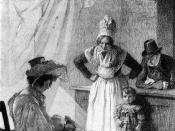In the novel Madame Bovary, Gustave Flaubert displays through the use of symbolism the moral corruption that eventually consumes Emma's being. Flaubert uses a combination of characters and objects to illustrate her impending downfall. At a young age, she harbors idealistic romantic illusions, longs for sophistication, sensuality, and passion, and descends into fits of extreme boredom and depression when her life fails to match the romantic novels she treasures.
Emma's bourgeois aspirations set her up to later be disappointed by Charles' unpolished boorish behavior. "But it was above all meal-times that were unbearable for her, in this small room on the ground-floor, with it's smoking stove, its creaking door, the walls that sweated, the damp flags; all the bitterness in life seemed served up on platter, and with the smoke of the boiled beef there rose from her secret soul whiffs of sickliness. Charles was a slow eater...". The quote employs description to express the distain Emma feels toward the Bovary home.
"She now let everything in her household take care of itself... she who was formally so careful, so dainty, now passed whole days without dressing, wore grey cotton stockings, and burnt tallow candles. She kept saying they must be economical since they were not rich..." At this point in the novel Emma appears to be fed up with her life. She is pretending to be happy but her actions around the house proves different. She used to tidy up and take pride in her personal up keep. Emma's health is failing her but only because it is self inflicted. She is causing herself to be miserable. As a result Charles makes the decision to move to Yonville in hopes of improving Emma's health. As she prepares to move she stumbles across her wedding bouquet which she burns...


